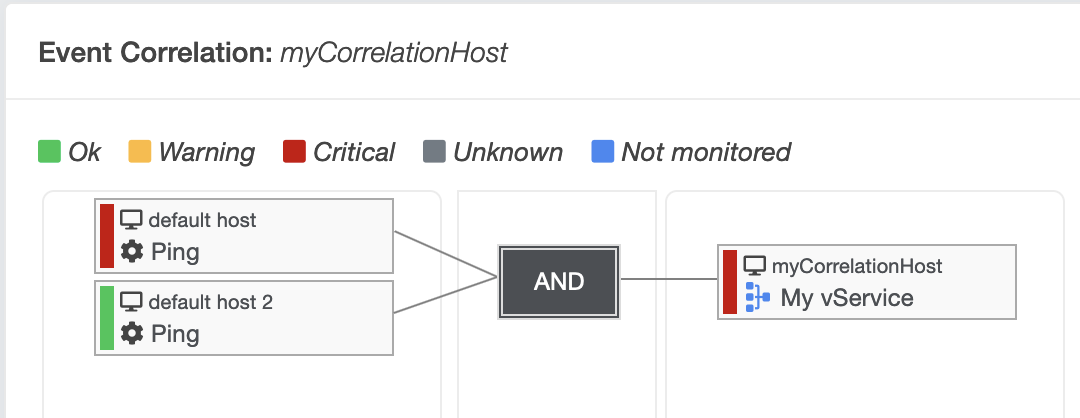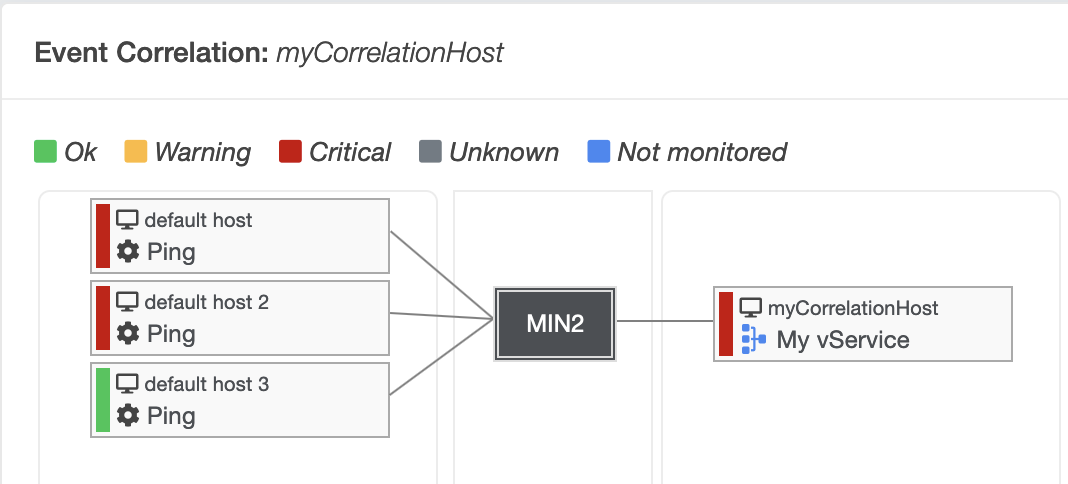Event correlation CE¶
The event correlation module in openITCOCKPIT is a very helpful component when you need a single, overall status for different services.
So what is an “event correlation”? Simply put, an event correlation is a virtual host with virtual services.
When creating an event correlation, a host is created that is derived from the "EVC Template" type host template.
This virtual host is then visible just like any real host in the host overview.
Creating event correlations¶
After the host for the event correlation has been created, the event correlation itself can then be edited.
In a new event correlation, a single level is initially visible. At this level, click on the button "New vService".
Several services can be connected to each other by logical operators. After a logical operator is created, a virtual service (vService) is always created, which in turn assumes the status drawn from the services and the operator.
The following operators are possible:
AND¶
The "AND" operator requires that all its services have the status OK so that the virtual service also receives an OK status.
OR¶
With the "OR" operator, at least one service must have the status OK for the virtual service to receive an OK status.
EQUALS¶
The "EQUALS" operator can only have one service. This operator is suitable for "looping through" a service status in order to use it again in a later level.
MIN¶
The "MIN" operator also requires a number as a specifier. This number indicates how many services must have the status OK so that the virtual service receives an OK status.
Since virtual services are treated like real services by the system, it is possible to add services to a link that are also virtual services from another event correlation.
| Field | Required | Description |
|---|---|---|
| Basic configuration | ||
| Container | Container in which the host is to be created | |
| Host templates | Host template in which the host is to be created | |
| Host name / name of the correlation | Name of the host or event correlation to be created | |
| Description | Description of the host template. Will be inherited as the host description | |
| Priority | Priority for filtering in lists | |
| Checking configuration | ||
| Checking period | Defines the timeperiod in which checks should take place | |
| Checking interval | Defines the interval at which checks should take place. See intervals | |
| Repeat interval | Defines the waiting period before a new check takes place after a non-UP status has been reached. See intervals | |
| Max. number of checking attempts | Determines the number of attempts to check a host before it transitions to a hard state. See Intervalle | |
| Notification configuration | ||
| Notification period | Determines the time period in which notifications are sent for a host | |
| Notification interval | Defines the interval for notifications sent to this host | |
| Contacts | One or more contacts who will receive notifications about this host | |
| Contact groups | One or more contact groups that will receive notifications about this host | |
| Host notification options | Defines the statuses that must be reached before notifications are sent |



